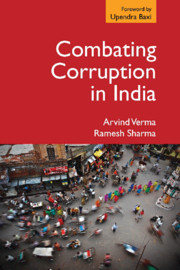Foreword
Published online by Cambridge University Press: 13 November 2018
Summary
No society or state will ever eliminate corruption but that is no argument against confronting or combating this practice. The dream of corruption-free society is always important as articulating discontent with systemic governance corruption (SGC, as I call it) and reinforcing moral crusades against it. However, the nightmare of corruption haunts millions of Indians. Obviously, for each generation, the important task is to devise strategies for controlling corrupt conduct.
The threshold difficulty, however, dwells in the very word ‘corruption’. Its social and juristic meanings do not always coincide. There are other allied words such as ‘bribery’, ‘nepotism’ and ‘ethnoclientism’. Difference among them is not just an affair of idiosyncrasy in style; it often reflects conceptual confusion as well as a matter of elegant toleration. The authors of this work do well to mediate on many of these differences and they remain entirely right in the view that systemic corruption is the tendency and conduct to use public office for private gain.
The learned authors of this thought-provoking work supplement their scholarship with the vigor of experience and imagination shaped by considerable amount of intense policing work. This is an infrequent occurrence, as work on corruption remains generally the preserve of social scientists and legal academics. It is puzzling that while corruption in public life is monumental, work on its amelioration is scattered and sporadic. In this respect as well, the learned authors make a substantial contribution to the sparse literature.
They are clear that mega institutional frameworks will not work; what are needed are organizational and institutional settings in which daily corruption may be confronted by and on behalf of citizens in meso- and micro-level settings. Despite their unconcealed enthusiasm for the India Against Corruption movement led by Anna Hazare, the authors maintain that such arrangements may lead to a possible diminishing of democracy. They unequivocally write: ‘We also raise a red flag over the creation of an all-powerful enforcement agency in the country. An empowered, resource rich and independent police agency, though effective in combating corruption can also be a threat to democracy and open society.’ A principal merit of this work lies precisely in the difficult reconciliation of democracy with the first principles of combatting corruption.
- Type
- Chapter
- Information
- Combating Corruption in India , pp. xi - xiiPublisher: Cambridge University PressPrint publication year: 2018

